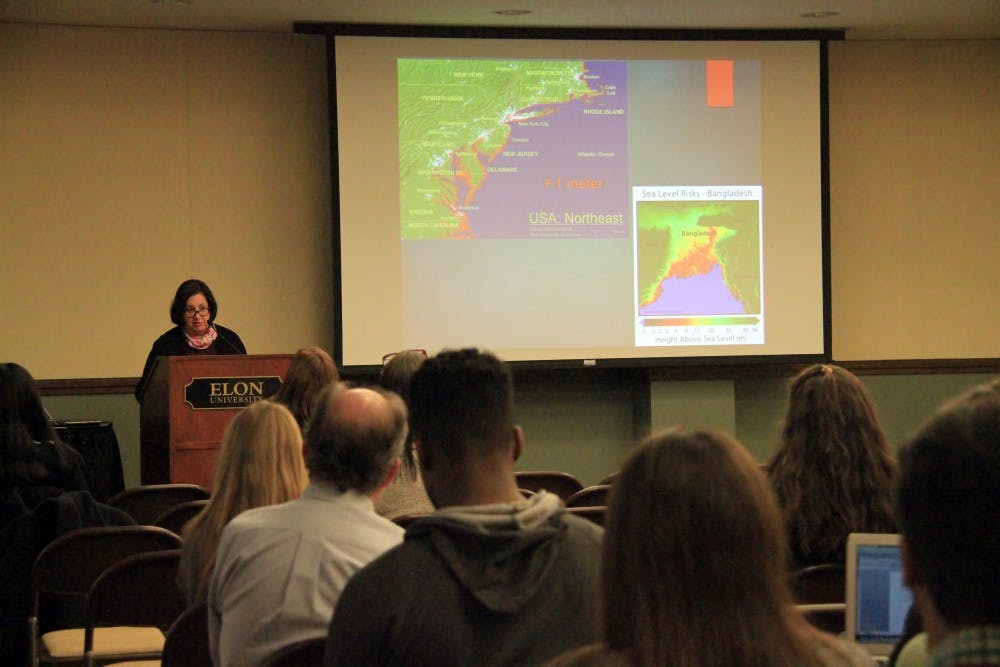If anyone could find optimism about the world’s climate crisis, it would be Eileen Claussen. With international experience as the founding president of the Center for Climate and Energy Solutions, and as Business Executive-in-Residence for Elon University’s Love School of Business, she is more than capable of finding hope.
So it might come as a surprise that she is pessimistic about the future of international sustainability.
“Nothing I am speaking [about] today is good news,” Claussen said. “In my 20-plus years of experience, I still find the path to a solution to be incredibly challenging."
Speaking to a large group of students Wednesday in upstairs Lakeside as part of a Core Forum, Claussen delved into the ever-growing danger of climate change and the repercussions of turning a blind eye.
She displayed disheartening statistics about the sea level rising three to six feet. According to Claussen, this rising sea level would devastate the United States, especially for the 40 percent of the population living in coastal areas like Miami and New York. Claussen's research also projects more droughts, floods and extreme weather will displace more than 18 million people by 2050.
She added that the main perpetrators of climate change are harmful emissions to the air. Claussen said emissions can come from anywhere, but the key sources are from developed, industrialized nations. China is currently the world leader in emissions at 28 percent, while the U.S. is closely behind at 16 percent.
Since 1992, the United States has been an essential player in international conferences devoted to stopping climate change. But until December 2015 in Paris — where 196 countries agreed to reduce global warming by two degrees-Celsius — many of the bills proposed failed to ratify and reach a consensus.
Claussen said most of the goals the countries set for reducing their emission discharge had been previously imposed voluntarily without any consequences.
Though she admitted the fervor this issue demands can’t be placed on the shoulders the United States, she said it's hard to make demands to the rest of the world when the United States is somewhat of a hypocrite.
“The response to this has to be a global one,” Claussen said. “But how do you convince other countries that they must reduce their emissions when you are the largest emitter and have done very little to reduce yours?”
In light of election season, she praised Democratic candidates Hillary Clinton and Bernie Sanders having policy-driven debates about climate change. In contrast, Claussen said Republican candidates Donald Trump and Ted Cruz question the legitimacy of climate change.
Climate change is real and caused by human activity.Our job is to aggressively transform our energy system away from fossil fuels.
— Bernie Sanders (@SenSanders) February 9, 2016
Any and all weather events are used by the GLOBAL WARMING HOAXSTERS to justify higher taxes to save our planet! They don't believe it $$$$!
— Donald J. Trump (@realDonaldTrump) January 26, 2014
Despite the gloom and despair, Claussen’s message had a silver lining. She said the only way this issue can be solved isto acknowledge it exists and can be attacked.
She then said the biggest way to reduce global warming is citizen engagement. While clean technology, resources and a sense of urgency are all necessary, the general public's voice will force politicians to act.
“We need citizen engagement to make it clear to politicians that their fortunes and future are tied directly into reducing climate change,” she said. “Whether we achieve this or not is up to us."


